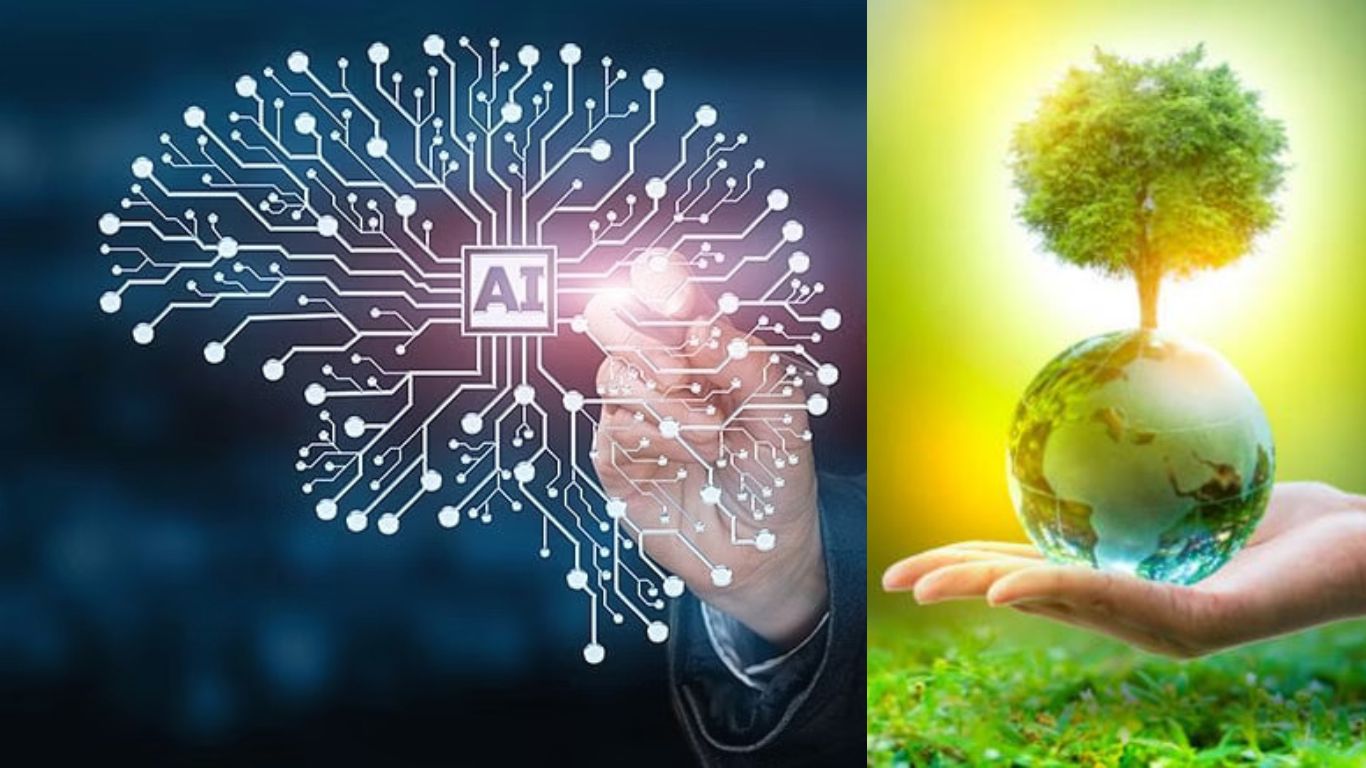The earth’s climate is changing at an alarming rate, and AI is one of the most significant technologies to help in mitigation the of climate change, a tremendous challenge facing humanity today. The consequences of climate change are widespread and include increased frequency and severity of natural disasters, rising sea levels, and disruptions to ecosystems and biodiversity. The need for urgent action to mitigate climate change has never been more critical, and one technology that is making significant contributions in this regard is Artificial Intelligence (AI).
AI is a rapidly advancing field that has the potential to revolutionize how we approach environmental problems. By processing vast amounts of data, AI can help us make informed decisions and take action to reduce greenhouse gas emissions, increase energy efficiency, and promote sustainable practices. Here are some ways in which AI is contributing to mitigating climate change:
1. Energy efficiency
AI can be used to optimize energy consumption in buildings, factories, and transportation systems. By analyzing data from sensors and other sources, AI algorithms can identify patterns and recommend changes that can significantly reduce energy consumption. For example, AI-powered HVAC systems can adjust temperature and lighting based on occupancy and weather conditions, reducing energy waste.
2. Renewable energy
AI can also help optimize the production and distribution of renewable energy sources like wind and solar power. By analyzing weather patterns and energy demand, AI algorithms can predict when and where energy will be needed, allowing for more efficient use of renewable energy sources.
3. AI and Agriculture
Agriculture is a significant contributor to greenhouse gas emissions, but AI can help reduce these emissions by optimizing crop yields, reducing water usage, and promoting sustainable farming practices. AI algorithms can analyze soil data and weather patterns to recommend the optimal use of fertilizers and irrigation, reducing waste and emissions.
4. AI in Climate Modeling
AI is also being used to improve climate modeling and forecasting, helping us better understand how climate change is affecting the planet. By analyzing vast amounts of data, AI algorithms can predict future weather patterns, sea levels, and other critical climate factors, allowing policymakers to make informed decisions about how to mitigate the effects of climate change.
5. Wildlife conservation
AI is also being used to monitor and protect wildlife populations threatened by climate change. For example, AI-powered drones and satellites can monitor changes in habitats and migration patterns, allowing conservationists to take action to protect endangered species.
In conclusion, AI is a powerful tool in the fight against climate change. By helping us make better use of renewable energy sources, reduce energy waste, promote sustainable practices, and protect wildlife, AI is contributing to a more sustainable and resilient future. It is important to continue to invest in AI research and development to maximize its potential for mitigating the effects of climate change.








erythromycin pills cost
purchase zofran
Marc Jacobs – это не просто бренд, это стиль жизни. И если вы хотите выглядеть стильно и модно, то наш магазин marcjacobs-russia.com поможет вам в этом. У нас вы найдете огромный выбор женских сумок и рюкзаков, которые отличаются оригинальным дизайном, высоким качеством и практичностью. Каждая модель создана с заботой о вас и вашем комфорте, а также с учетом последних тенденций мировой моды.
Приобретая сумки и рюкзаки Marc Jacobs в нашем магазине, вы не только получаете высококачественный товар, но и входите в круг модных и стильных людей. Заказывайте сейчас на сайте marcjacobs-russia.com и становитесь частью мира Marc Jacobs!
Официальный магазин женских сумок Marc Jacobs – marcjacobs-russia.com
finasteride discount coupon
Каждая женщина мечтает о красивой сумке, которая подчеркнет ее индивидуальность и стиль. И наш магазин marcjacobs-bags.ru готов помочь вам в этом! Мы запускаем апрельскую распродажу женских сумок Marc Jacobs, где вы найдете лучшие модели по низкой цене. Выбирайте сумки в разных цветах, формах и размерах, и пусть ваша сумка станет не только украшением, но и незаменимым помощником!
vds сервер – vps дешевый, арендовать vds
buy silagra online uk
how much is ivermectin
cymbalta 60 mg capsules
[url=https://dupen.su]заказать комод[/url] – купить мягкую мебель, заказать кухню
diflucan prescription online
dipyridamole buy online
generic paxil cost
бамланивимаб этесевимаб аптеки купить – Paxlovid, Оземпик 3 мл купить
zestoretic
azithromycin 500 price in india
albendazole 400 mg cost
Выгодное обновление гардероба – новые стильные брюки, летние платья и костюмы на Nomi.Fashion со скидкой до 30%!
Порадуйте себя новыми стильными вещами от Nomi.Fashion! В нашем ассортименте появились новые модели женских брюк, летних платьев и костюмов для деловых встреч. И все это со скидкой до 30%! Торопитесь обновить свой гардероб по выгодной цене.
Стильные брюки – идеальный выбор для тех, кто ценит комфорт и моду. Летние платья подарят вам ощущение легкости и свежести в жаркие дни, а костюмы для деловых встреч добавят уверенности и профессионализма вашему образу. Не упустите возможность приобрести новинки от Nomi.Fashion со скидкой до 30%!
Посмотрите весь наш каталог:
[url=https://nomi.fashion/catalog/palto/]пальто альпака женское купить[/url]
[url=https://nomi.fashion/catalog/palto/]купить демисезонное пальто женское[/url]
[url=https://nomi.fashion/catalog/palto/]купить демисезонное пальто женское[/url]
feldene gel over the counter
lesbian mature: dating chat – dating web site
prednisone 50 mg tablet cost: https://prednisone1st.store/# prednisone daily use
Novyny
can i purchase mobic without dr prescription: can you buy cheap mobic for sale – can you get mobic for sale
where can i buy generic mobic without a prescription: cost of generic mobic without a prescription – where to buy generic mobic tablets
canadian online pharmacy reviews buy drugs from canada
amoxicillin 250 mg capsule: https://amoxicillins.com/# generic amoxicillin online
treatments for ed best male ed pills treatment of ed
amoxicillin brand name: http://amoxicillins.com/# buy amoxicillin online mexico
amoxicillin price without insurance amoxicillin 500 mg tablet price – amoxicillin 500mg buy online canada
cost of amoxicillin prescription buy amoxicillin online with paypal – generic amoxicillin over the counter
best erectile dysfunction pills: pills for ed – what is the best ed pill
Medscape Drugs & Diseases.
natural remedies for ed: treatment for ed – ed pills for sale
Commonly Used Drugs Charts.
home order generic propecia without dr prescription
amoxicillin online pharmacy amoxicillin 500mg prescription – buy amoxicillin online with paypal
cost cheap propecia tablets get propecia no prescription
amoxicillin 500mg prescription: https://amoxicillins.com/# amoxicillin 500 mg price
canadian pharmacy meds canadian pharmacy
https://mobic.store/# where can i get generic mobic pills
top ed pills best male enhancement pills compare ed drugs
otc ed pills ed pills that work non prescription ed pills
buy propecia without dr prescription buy cheap propecia tablets
Get information now.
buying generic propecia order cheap propecia without prescription
Definitive journal of drugs and therapeutics.
amoxicillin canada price purchase amoxicillin online without prescription – rexall pharmacy amoxicillin 500mg
can i buy cheap mobic no prescription: buy mobic online – where can i get cheap mobic without dr prescription
fenofibrate 160mg oral tricor oral buy tricor 160mg
https://pharmacyreview.best/# canadian pharmacy prices
where can i buy generic mobic without insurance how to buy cheap mobic without a prescription how to buy mobic without prescription
propecia no prescription get propecia pills
mexican drugstore online: best online pharmacies in mexico – mexican online pharmacies prescription drugs
medication from mexico pharmacy: mexican rx online – mexico pharmacies prescription drugs
https://mexpharmacy.sbs/# medicine in mexico pharmacies
https://indiamedicine.world/# india online pharmacy
india pharmacy mail order: indian pharmacy paypal – indian pharmacy
indian pharmacies safe: reputable indian online pharmacy – pharmacy website india
http://mexpharmacy.sbs/# mexican rx online
adderall canadian pharmacy: best canadian pharmacy – canadian pharmacy meds
http://mexpharmacy.sbs/# mexico pharmacies prescription drugs
reputable indian pharmacies: Online medicine home delivery – online pharmacy india
http://certifiedcanadapharm.store/# canadian valley pharmacy
canada pharmacy online: legitimate canadian mail order pharmacy – best rated canadian pharmacy
http://mexpharmacy.sbs/# mexico pharmacies prescription drugs
pharmacy website india: online pharmacy india – indian pharmacy online
canada ed drugs: canadianpharmacyworld com – canadapharmacyonline
purchase ketotifen generic order sinequan 75mg generic order imipramine sale
https://certifiedcanadapharm.store/# northwest canadian pharmacy
https://indiamedicine.world/# indian pharmacy
canadian online pharmacy: canadian online pharmacy – my canadian pharmacy rx
indian pharmacy online: world pharmacy india – canadian pharmacy india
brand cialis 40mg buy tadalafil 10mg pill sildenafil 100mg sale
http://certifiedcanadapharm.store/# cheap canadian pharmacy
http://mexpharmacy.sbs/# п»їbest mexican online pharmacies
buying prescription drugs in mexico: reputable mexican pharmacies online – medication from mexico pharmacy
buy medicines online in india: india online pharmacy – indian pharmacy
neurontin 204: neurontin 800 mg tablets best price – neurontin 600
https://stromectolonline.pro/# ivermectin cream canada cost
precose canada glyburide 2.5mg pills order fulvicin 250 mg online cheap
zithromax cost uk zithromax online usa no prescription buy zithromax without presc
neurontin 200 mg tablets: neurontin singapore – neurontin 300 mg pill
https://gabapentin.pro/# cheap neurontin
mintop canada buy cialis 20mg generic generic ed drugs
http://stromectolonline.pro/# ivermectin cream cost
neurontin cap: neurontin 300 mg capsule – neurontin 300 mg pill
https://gabapentin.pro/# prescription medication neurontin
ivermectin buy nz ivermectin 12 mg ivermectin otc
https://azithromycin.men/# zithromax 500mg over the counter
cost of ivermectin medicine: ivermectin 1 cream – ivermectin 2%
buy antibiotics over the counter: antibiotic without presription – buy antibiotics from india
get antibiotics quickly: Over the counter antibiotics for infection – Over the counter antibiotics for infection
https://antibiotic.guru/# buy antibiotics from india
buy antibiotics for uti: get antibiotics quickly – buy antibiotics from india
buy generic aspirin for sale purchase imiquimod generic order imiquimod generic
http://lisinopril.pro/# prinivil brand name
https://lipitor.pro/# buy lipitor online
generic dipyridamole buy gemfibrozil generic buy pravachol 20mg pills
http://misoprostol.guru/# cytotec buy online usa
http://lisinopril.pro/# zestril 10mg price
http://ciprofloxacin.ink/# buy cipro online canada
http://misoprostol.guru/# buy cytotec pills
cheap melatonin 3mg aygestin 5mg cheap danazol online buy
http://ciprofloxacin.ink/# buy generic ciprofloxacin
https://ciprofloxacin.ink/# buy generic ciprofloxacin
order fludrocortisone 100 mcg without prescription buy florinef 100 mcg pills imodium over the counter
https://avodart.pro/# can i order generic avodart without dr prescription
order generic duphaston 10 mg order januvia 100 mg generic jardiance 10mg without prescription
pharmacy website india: online shopping pharmacy india – world pharmacy india
reputable indian pharmacies reputable indian pharmacies world pharmacy india
best online pharmacy india: indian pharmacy – pharmacy website india
medicine in mexico pharmacies: medicine in mexico pharmacies – pharmacies in mexico that ship to usa
how to buy prasugrel detrol without prescription buy cheap generic detrol
order etodolac 600 mg for sale oral cilostazol 100mg cilostazol 100mg without prescription
Can I contact admin??
It is important.
Regards.
buy ferrous 100 mg pills risedronate usa order sotalol 40 mg sale
Help is needed?
How to create your first post.
Yours faithfully.
Is there any of the moderators, because I can not answer a new topic?
Maybe I’m not writing correctly?
Please tell me.
Thank you.
generic pyridostigmine 60 mg pyridostigmine 60 mg over the counter maxalt buy online
buy enalapril 5mg generic buy doxazosin 2mg lactulose without prescription
Is there a moderator, do you need your help changing my password?
Can I create a new username and password?
Need your help.
Thank you.
indian pharmacy paypal: Medical Store in India – best online pharmacy india
удалите пожалуйста[url=https://sylnaukraina.com.ua/].[/url]
betahistine 16 mg canada order xalatan without prescription order generic probenecid
pharmacy website india: Online medication home delivery – indian pharmacy paypal
buy cheap generic latanoprost capecitabine oral exelon 6mg over the counter
india pharmacy mail order: Online medication home delivery – online shopping pharmacy india
order prilosec generic brand montelukast 5mg lopressor 100mg drug
no prescription rx medicine
order premarin 0.625mg generic buy premarin 600 mg viagra 100mg cheap
telmisartan 80mg generic telmisartan without prescription buy molnupiravir for sale
reputable canadian online pharmacies
Online medicine home delivery: indian pharmacy – pharmacy website india
They ensure global standards in every pill. best online canadian pharmacy: www canadianonlinepharmacy – best online canadian pharmacy
doxycycline mexican pharmacy
buying from online mexican pharmacy: mexican online pharmacies prescription drugs – mexican pharmaceuticals online
online blackjack real money buy levothroid pill synthroid 75mcg price
Every visit reaffirms why I choose this pharmacy. pharmacies in mexico that ship to usa: mexico drug stores pharmacies – mexican drugstore online
methylprednisolone 4 mg without prescription medrol for sale order aristocort 4mg generic
п»їbest mexican online pharmacies: mexican border pharmacies shipping to usa – pharmacies in mexico that ship to usa
medication from mexico pharmacy: mexico pharmacies prescription drugs – buying prescription drugs in mexico online
my canadian pharmacy viagra
The most pleasant pharmacy experience every time. canadian pharmacy india: indianpharmacy com – canadian pharmacy india
clomiphene 50mg over the counter azathioprine buy online buy azathioprine 50mg pills
indianpharmacy com: cheapest online pharmacy india – mail order pharmacy india
mexican pharmacy: buying from online mexican pharmacy – mexican online pharmacies prescription drugs
Their mobile app makes managing my medications so easy. reputable indian pharmacies: online pharmacy india – indianpharmacy com
world pharmacy india: india pharmacy – india online pharmacy
aceon 8mg for sale buy allegra paypal allegra 120mg oral
They are always proactive about refills and reminders. top 10 online pharmacy in india: top 10 pharmacies in india – indian pharmacy paypal
order vardenafil 10mg online zanaflex generic oral tizanidine
canadian neighbor pharmacy: northwest pharmacy canada – legitimate canadian pharmacies
best online pharmacy without prescriptions
mexican pharmaceuticals online: buying from online mexican pharmacy – mexican online pharmacies prescription drugs
The team always ensures that I understand my medication fully. buying prescription drugs in mexico online: mexican border pharmacies shipping to usa – purple pharmacy mexico price list
Read here. http://azithromycinotc.store/# buy generic zithromax online
the best ed pill Over the counter ED pills buying ed pills online
buy dilantin no prescription dilantin for sale online buy cheap ditropan
Their international partnerships enhance patient care. http://doxycyclineotc.store/# where can i get doxycycline uk
Their global health initiatives are game-changers. generic zithromax 500mg india: buy Z-Pak online – where can i get zithromax over the counter
A pharmacy that truly understands international needs. https://azithromycinotc.store/# buy zithromax online cheap
buying doxycycline online in usa buy doxycycline for acne doxycycline prescription australia
п»їbest mexican online pharmacies or mexican pharmacy – purple pharmacy mexico price list
mexican border pharmacies shipping to usa or pharmacy in mexico – mexico drug stores pharmacies
order pamelor 25 mg for sale purchase methotrexate online cheap buy panadol without prescription
medication from mexico pharmacy or mexican pharmacies – mexican drugstore online
medicine in mexico pharmacies : mexican pharmacy online – pharmacies in mexico that ship to usa
brand orlistat 120mg order xenical 60mg pills oral diltiazem 180mg
http://canadapharmacy24.pro/# ordering drugs from canada
mail order pharmacy india: online shopping pharmacy india – mail order pharmacy india
warfarin uk order reglan for sale metoclopramide 10mg pills
https://indiapharmacy24.pro/# top online pharmacy india
canadian pharmacy king reviews: Pharmacies in Canada that ship to the US – reliable canadian pharmacy
https://indiapharmacy24.pro/# indian pharmacy
ivermectin 0.5% brand name: stromectol tablets buy online – ivermectin tablet price
order minocycline 50mg: stromectol order online – order minocycline 100mg online
astelin tablet acyclovir 400mg over the counter irbesartan 300mg drug
https://stromectol.icu/# minocycline pill
buy pepcid generic order pepcid 20mg generic prograf 1mg pills
https://mobic.icu/# how to buy cheap mobic without a prescription
stromectol covid: ivermectin where to buy – stromectol australia
http://viagra.eus/# sildenafil 50 mg price
п»їcialis generic Cialis over the counter Cialis 20mg price in USA
http://kamagra.icu/# buy Kamagra
tamsulosin 0.2mg generic order ondansetron 8mg for sale zocor for sale
http://kamagra.icu/# Kamagra 100mg price
https://kamagra.icu/# Kamagra 100mg price
Vardenafil buy online Cheap Levitra online Vardenafil buy online
help with essays paper writing online buy research papers online no plagiarism
mexican online pharmacies prescription drugs: reputable mexican pharmacies online – mexican mail order pharmacies mexicanpharmacy.company
canadian online pharmacy: recommended canadian pharmacies – buying from canadian pharmacies canadapharmacy.guru
https://mexicanpharmacy.company/# buying prescription drugs in mexico mexicanpharmacy.company
http://indiapharmacy.pro/# buy medicines online in india indiapharmacy.pro
my canadian pharmacy review: canadian world pharmacy – canadian pharmacy meds canadapharmacy.guru
buy generic spironolactone 25mg proscar ca buy finasteride 1mg generic
canadian pharmacy phone number: canada drug pharmacy – prescription drugs canada buy online canadapharmacy.guru
buying drugs from canada: pharmacy canadian – canadian pharmacies compare canadapharmacy.guru
http://mexicanpharmacy.company/# mexican drugstore online mexicanpharmacy.company
https://mexicanpharmacy.company/# medicine in mexico pharmacies mexicanpharmacy.company
mexico drug stores pharmacies: pharmacies in mexico that ship to usa – reputable mexican pharmacies online mexicanpharmacy.company
sildenafil 50mg sale purchase aurogra for sale yasmin price
online canadian pharmacy: canada rx pharmacy – canadapharmacyonline legit canadapharmacy.guru
https://canadapharmacy.guru/# canadian pharmacies compare canadapharmacy.guru
mail order pharmacy india: reputable indian pharmacies – online shopping pharmacy india indiapharmacy.pro
buy fluconazole 100mg online buy diflucan 200mg cipro price
http://indiapharmacy.pro/# india online pharmacy indiapharmacy.pro
http://mexicanpharmacy.company/# mexican pharmaceuticals online mexicanpharmacy.company
reddit canadian pharmacy: canadian pharmacy meds reviews – canadian pharmacy india canadapharmacy.guru
http://mexicanpharmacy.company/# mexican rx online mexicanpharmacy.company
best online pharmacies in mexico: medicine in mexico pharmacies – best online pharmacies in mexico mexicanpharmacy.company
https://indiapharmacy.pro/# mail order pharmacy india indiapharmacy.pro
buy lamictal 50mg generic order minipress 2mg generic purchase mebendazole generic
best india pharmacy: cheapest online pharmacy india – top 10 pharmacies in india indiapharmacy.pro
https://indiapharmacy.pro/# п»їlegitimate online pharmacies india indiapharmacy.pro
indianpharmacy com: online pharmacy india – indian pharmacy indiapharmacy.pro
pharmacy website india: pharmacy website india – pharmacy website india indiapharmacy.pro
canada drugs reviews [url=http://canadapharmacy.guru/#]canadian pharmacy store[/url] cheapest pharmacy canada canadapharmacy.guru
metronidazole 400mg brand flagyl for sale online buy cephalexin online
http://indiapharmacy.pro/# indian pharmacy indiapharmacy.pro
mexico pharmacy: buying prescription drugs in mexico online – purple pharmacy mexico price list mexicanpharmacy.company
pharmacies in mexico that ship to usa: buying prescription drugs in mexico – purple pharmacy mexico price list mexicanpharmacy.company
http://indiapharmacy.pro/# top 10 pharmacies in india indiapharmacy.pro
https://canadapharmacy.guru/# canadian pharmacy 365 canadapharmacy.guru
https://canadapharmacy.guru/# my canadian pharmacy rx canadapharmacy.guru
pharmacy rx world canada: legitimate canadian pharmacy online – buying drugs from canada canadapharmacy.guru